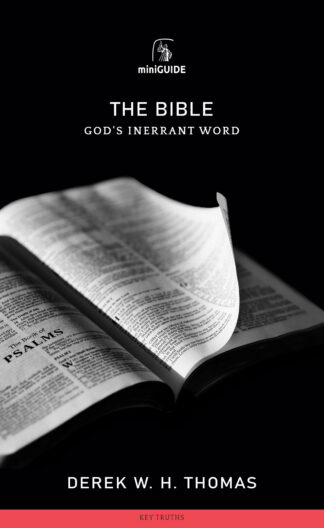Setting the Word of God Free
The problem that confronts us all and dwarfs every other is how are we to bring the Word of God to our generation? If the apostles saw fit to appoint others to serve tables that they might devote themselves ‘continually to prayer and the ministry of the Word,’ it is clear that any ministry which lays claim to being apostolic in character must have the same order of priorities.
How then can we to whom this task has been committed discharge our responsibility before God and bring his Word to our generation?
The reason why this question has to be asked at all is because today the Word of God is bound. In the first age of the church this was not so. Although Paul himself was in prison he was able to write, ‘I suffer trouble even unto bonds, but the Word of God is not bound.’ Our experience is different. We ourselves are free, but the Word of God is bound. Of the two ours is the worse situation for the church of God. Better that we should be bound and the Word of God free than that we should be free and the Word of God bound.
The Word of God, however, was bound in our Lord’s time. It was he who set it free to do its work. The Word was bound because the scribes sat in Moses’ seat and taught for doctrines the traditions of men. An official, formal, and legalistic method of interpreting the Scriptures had forced their meaning and message into a strait-jacket. The traditions of the fathers and the authority of the scribes took the place of the authority of the Word of God.
The Word of God was bound later in the history of the church and in much the same way. Again it was overlaid by a formal and official interpretation, and approached in such a way that its true meaning was hidden. When this happened it was the same in effect as if the Bible had been taken from the church.
Luther wrote in his preface to the Epistle to the Romans, ‘Before this [its meaning] has been miserably darkened by glosses and all sorts of twaddle while in itself it is a shining light quite sufficient to illumine the whole Scripture.’ The meaning of the Gospel was not obscure but had been made obscure by an age which had allowed its understanding to be darkened and cast a cloud over the face of the sun itself. The webs of speculation woven about the Scripture had first to be torn away before the plain meaning became once more apparent.
Something similar has happened in the church during the last two hundred years, since the time of the Enlightenment or Age of Reason. Gradually the place and authority of the Word of God have been eroded. The fundamental presupposition of that movement was that the Bible should be treated simply as any other book, and that by this kind of examination it would yield its truth to us. This is like saying that man must be treated like any other animal, and to ignore his rational faculty. In so doing we should not discover the truth about man, but only a parody of his true nature based upon our own misunderstanding. So also by imposing on Scripture a preconceived notion of ‘truth’ the real meaning and message has eluded us. Beginning with the purpose of elucidating the true meaning of Scripture the spirit of the Enlightenment with its critico-historical approach has brought us to the point of complete scepticism even about the Person of our Lord himself.
The Word of God is bound by an attitude of mind which no longer trusts the Scriptures as a revelation of God’s truth because it has been taught to view them as the product of human minds and natural forces. This state of mind has not happened suddenly, nor has everyone concurred in its judgements, but it has gradually fashioned the outlook of many until it has become the general consensus of opinion both outside and inside the church.
How then can the Word of God be freed for our generation? How can its power and truth be felt once more?
It can happen when we begin to adopt a new attitude towards Scripture. The assumption has been that you may approach Scripture as you do any other book. If you do this it will not reveal its secrets to you. A revelation must be approached in a special way, as Moses learned when he stumbled into the presence of God and was told, ‘Put off thy shoes from off thy feet, for the ground whereon thou standest is holy ground.’ Or as Jacob, who similarly was surprised to find himself in God’s presence, said, ‘How dreadful is this place!’
Those who have themselves rediscovered the power and truth of God’s word and have been instrumental in setting it free in the past have testified to this truth. Archbishop Cranmer, for example, in his preface to the Bible wrote ‘. . .the learning of the Christian man ought to begin with the fear of God and to end in matters of high speculation; and not to begin with matters of high speculation and to end in the fear of God. . . the fear of God must be the first beginning, and as it were an ABC or an introduction to all them that shall enter into the very true and most fruitful knowledge of the Holy Scriptures.’ So then unless we are prepared to begin here how can we hope to go further and make any progress at all in understanding the Bible? God has explicitly closed all other paths to the knowledge of his Word. However useful the tools of human study are when combined with this attitude of reverence and respect that we must have for the Word of God, when they are employed apart from it they are absolutely worthless. We may not think that we can wrest the secrets of God’s Word from the Bible in any other way than that which he himself has appointed, for, should we try do so, we shall be like the Roman soldiers who forced their way into the Temple only to find to their confusion that there was nothing there!
Here then is the beginning we must all make if we are serious about this matter. ‘The fear of the Lord is the beginning of wisdom.’
The spirit of an age has taken hold of our minds and our approach to the Bible. Our outlook and attitude to it have been fashioned unconsciously by the age of Enlightenment and in consequence the truth of its revelation has been hidden from us. We cannot rediscover it until there is a change of attitude — metanoia — a new mind with which to approach God’s Word. The tools of criticism have come to be regarded as the principal means of elucidating the meaning of Scripture, whereas in fact they have securely locked up its truth, and the hubris of an age which has brought this about is the very opposite of the reverent, humble, and teachable mind to which the truth is revealed. ‘I thank thee, Father, Lord of heaven and earth, that thou hast hid these things from the wise and prudent, and hast revealed them unto babes.’ So it has been and so it will always be!
The power and truth of God’s Word will be disclosed to us when we come to it with a fresh attitude of mind, when we are willing to regard him who speaks to us in it and to stand in awe of his revelation in his written Word.
We must each decide before God what our attitude is; whether it is one of serious submission and reverence to God’s Word, or of superficial interest and unconcern. If we fail to approach God’s Word in the right way we not only obstruct its work and progress in ourselves but in the Church and in this generation. We ensure that the Word of God remains bound and bring upon ourselves that most terrible indictment of our Lord: ‘Ye have taken away the key of knowledge: ye entered not in yourselves, and them that were entering in ye hindered.’
This article was first published in the April 1976 edition of the Banner of Truth magazine.
Of Further Interest

The Bible
God’s Inerrant Word
Description
The problem that confronts us all and dwarfs every other is how are we to bring the Word of God to our generation? If the apostles saw fit to appoint others to serve tables that they might devote themselves ‘continually to prayer and the ministry of the Word,’ it is clear that any ministry which […]

Description
The problem that confronts us all and dwarfs every other is how are we to bring the Word of God to our generation? If the apostles saw fit to appoint others to serve tables that they might devote themselves ‘continually to prayer and the ministry of the Word,’ it is clear that any ministry which […]
Latest Articles
On the Trail of the Covenanters February 12, 2026
The first two episodes of The Covenanter Story are now available. In an article that first appeared in the February edition of the Banner magazine, Joshua Kellard relates why the witness of the Scottish Covenanters is worthy of the earnest attention of evangelical Christians today. In late November of last year, on the hills above […]
A Martyr’s Last Letter to His Wife February 11, 2026
In the first video of The Covenanter Story, which releases tomorrow, we tell the story of James Guthrie, the first great martyr of the Covenant. On June 1, the day he was executed for high treason, he coursed the following farewell letter to his wife: “My heart,— Being within a few hours to lay down […]
